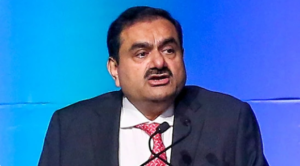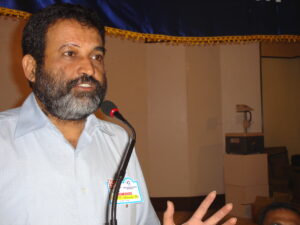 Adani vs. Hindenburg: SEBI Chairperson Addresses Accusations Amid Ongoing Controversy
Adani vs. Hindenburg: SEBI Chairperson Addresses Accusations Amid Ongoing Controversy
The continuing drama involving the Adani Group and US-based short-seller Hindenburg Research has taken a new turn, with Madhabi Puri Buch, the chairman of the Securities and Exchange Board of India (SEBI), and her husband Dhaval Buch at the center of the latest issue. Renowned for its in-depth investigations on high-profile firms, Hindenburg Research has now claimed that the chairman of SEBI had a financial interest in offshore companies connected to the alleged money-siphoning affair involving Adani. Madhabi and Dhaval Buch have responded with urgency and vehemence, denouncing the charges as irrational and a calculated attempt at character assassination.
The Charges: An Additional Facet in the Adani-Hindenburg Scandal
The most recent research from Hindenburg Research provides a new perspective on the already fierce disagreement between the Adani Group and the short seller. The SEBI chairwoman, Madhabi Puri Buch, is accused in the report of having unreported ties to offshore businesses that the Adani Group reportedly employed for questionable financial operations. The aforementioned accusations give rise to concerns regarding the impartiality and integrity of SEBI’s regulatory actions affecting Adani, since they seem to indicate a possible conflict of interest.
Given that SEBI has been aggressively pursuing enforcement measures against a number of organizations, including serving Hindenburg Research with a show-cause notice, the timing of these claims is very significant. The shocking claim that SEBI’s top officer may have been complicit in the very financial malfeasance that the agency is tasked with stopping has garnered a lot of attention.
The SEBI Chairperson’s Reaction: A Firm Rebuttal
Madhabi Puri Buch and the man she married Dhaval Buch didn’t take long to confront the accusations. They jointly issued a statement in which they flatly refuted the allegations presented by Hindenburg Research, calling them “baseless” and untrue. The Buchs stressed that they had disclosed all relevant information to SEBI throughout the years and that their lifestyles and finances are transparent.
They even go so far as to say that Hindenburg’s charges are an act of reprisal for SEBI’s enforcement activities. The Buchs charged Hindenburg with trying to carry out a “character assassination,” a grave accusation that suggests the short-seller has personal or vindictive goals in addition to his investigative ones.
The Buchs have indicated that they are ready to contest these accusations in both the legal and public domains by pledging to provide a more thorough response in due time. possibly having an impact on how current investigations and enforcement actions turn out.
The More Comprehensive Framework: Hindenburg’s Inquiry Approach
With the release of in-depth analyses on what it perceives to be dishonest or immoral business practices by large organizations, Hindenburg Research has established a reputation for itself. Its approach frequently entails short-selling these firms’ stocks prior to the publication of its reports in the hopes that the disclosures will lower the stock prices.
Hindenburg’s January 2023 investigation against Adani said that the company was involved in a “brazen stock manipulation and accounting fraud scheme.” The financial markets were rocked by this disclosure, which caused a sharp decline in the price of Adani’s shares and raised concerns about the company’s financial handling procedures. The most recent accusations made against the chairman of SEBI seem to be a continuation of Hindenburg’s larger approach, with the goal of further undermining the legal framework in which Adani conducts business.
Conclusion: The Debate Is Far From Ended
The conflict involving the Adani Group, Hindenburg Research, and currently SEBI’s leadership is far from resolved. There is a lot on the line, and it will have an impact on everyone. The financial community will be intently observing this incident to see how Madhabi Puri Buch and her husband handle it as they get ready to issue a thorough statement.
The current events underscore how intricately corporate power, regulatory supervision, and investigative media interact. It is crucial to maintain accountability, transparency, and integrity in a setting where accusations can have far-reaching effects. The crucial question still stands as the circumstances change: who will come out of this with their reputation unharmed, and what will be the long-term effects on regulatory bodies and financial markets in India?
Hindenburg’s Claims Are Labeled as “Character Assassination by a Vulture Fund” by Mohandas Pai
Former Infosys CFO Mohandas Pai has entered the ongoing dispute between Hindenburg Research and the Adani Group, giving it even another dramatic twist. The most recent accusations made by Hindenburg Research against SEBI Chairperson Madhabi Puri Buch have drawn harsh criticism from Pai, who described them as “character assassination by a vulture fund.” In light of the heightened scrutiny surrounding the integrity of India’s financial oversight, this represents an important defense of SEBI and its regulatory structure.
Pai’s Sturdy Rebuttal: Upholding Buch and SEBI
Hindenburg’s assertions were brushed aside by Pai in response to the issue on social networking platform X, calling them “rubbish allegations aimed at sensationalism.” He made it clear that these charges are merely Hindenburg’s attempt to fabricate unwarranted controversy, particularly in light of the fact that the Adani Group-related issues had already been resolved by an esteemed panel that presided over an inquiry that was supervised by the Supreme Court.
According to Pai’s remarks, Hindenburg is acting desperately in an attempt to garner attention and damage SEBI and its chairman, especially in light of the fact that the earlier accusations against the Adani Group were thoroughly investigated by the highest courts.
A More Comprehensive Protection of SEBI’s Regulatory Integrity
Pai also supported SEBI’s regulatory procedures in his remarks, pointing out that they apply only to Real Estate Investment Trusts (REITs). He maintained that the norms set forth by SEBI are the outcome of protracted discussions and represent a shared understanding between regulators and the market. He emphasized that the new rules are based on international standards, demonstrating SEBI’s dedication to upholding a strong and open regulatory framework.
This defense is important because it backs SEBI’s leadership and upholds the overall integrity of India’s financial regulatory system at a time when foreign organizations like Hindenburg Research are casting doubt on it.
The Effects of Pai’s Statements
By characterizing Hindenburg’s activities as an opportunistic attack on India’s regulatory institutions, Mohandas Pai’s intervention gives a strong voice to the ongoing debate. Through the designation of Hindenburg as a “vulture fund,” Pai portrays the short-seller as a predatory organization hoping to make money off of unsettled Indian markets and damaged reputations without providing any concrete proof.
This portrayal could strike a chord with many who see Hindenburg’s strategies as assertive and possibly detrimental to the larger financial system. Pai’s remarks might mobilize support for SEBI and its chairwoman, assisting in dispelling the myth that Hindenburg is trying to create about purported misbehavior within the regulatory authority.
In conclusion, a conflict between stories
The struggle of narratives is getting more intense as the Hindenburg-Adani controversy develops. Mohandas Pai’s adamant defense of Madhabi Puri Buch, the chairperson of SEBI, demonstrates the divergent opinions expressed in this matter. Critics like as Pai view Hindenburg Research’s actions as destructive and risky, motivated more by profit than by a sincere concern for maintaining the integrity of the market, despite the company’s positioning as a watchdog exposing financial misconduct.
Further changes are probably in store as both sides press their cases in the court of public opinion in the days to come. Thus far, Pai’s comments have brought a fresh perspective to the conversation by highlighting the necessity of exercising caution and skepticism when assessing the statements made by organizations with vested interests.
 Adani vs. Hindenburg: SEBI Chairperson Addresses Accusations Amid Ongoing Controversy
Adani vs. Hindenburg: SEBI Chairperson Addresses Accusations Amid Ongoing Controversy